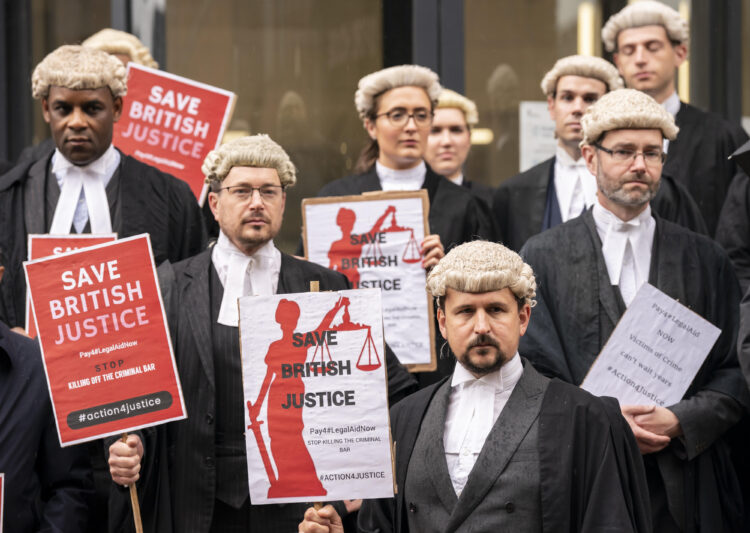By David Young-
Barristers in England And Wales are staging its full week of court walkouts over legal aid funding, as barristers prepare to argue their case directly with MPs.
The Criminal Bar Association (CBA) are complaining over a 28% cut in criminal legal aid fees in the past decade and is demanding a 25% increase. Barristers have criticised the offer as insufficient, highlighting the fact that specialist criminal advocates’ average annual income, after expenses, in the first three years of practice is £12,200.
A delegation of barristers are scheduled to meet MPs and parliamentarians at the Palace of Westminster this morning over the worrying circumstances that have led to the walk outs..
Jo Sidhu QC, CBA chair, said: “We bring our action for justice to the heart of parliament as those MPs who represent us all, need to hear from those of us who prosecute and defend on behalf of the voiceless – in particular the victims of crime left to suffer and languish by government’s ongoing failure to stem the massive exodus of criminal barristers.
“The great levelling up agenda will be strangled at birth without government properly funding legal aid to ensure that we have enough prosecutors and defenders dealing with the unprecedented backlog of 58,000 cases. Without proper funding there can be no diversity at the criminal bar and our judiciary will end up deprived of the talent of hundreds of women and minorities from ordinary backgrounds who have devoted their professional lives to the service of the public in our criminal courts.”
The Ministry of Justice has agreed to a 15% uplift in fees – the minimum recommended by an independent review – to new instructions beginning from the end of September but has so far rejected calls to apply it to existing cases.
Frustrated barristers are generally discontent with the increase because and could be waiting years before seeing the increased fees materialise since they only get aid at the conclusion of trials.
The extended strike action by barristers could add 12,000 more cases to the crown court backlog by August, according to a Bar source.
Data from The Ministry of Justice (MoJ) revealed a backlog of 58,653 outstanding cases in crown courts.
A Bar source said conservative calculations suggested that 80 per cent of the backlog accounts for trials and the total figure could reach 70,000 next month.
“Crown courts effectively shut down at the end of last week, most were empty by the afternoon and it will be the case again this week,” the source said.
“It illustrates the slow-moving car crash that has threatened the criminal justice system for years.”
Cases have been thrown into disarray after eight in 10 barristers voted in June to boycott taking on new cases in a long-running dispute between the Criminal Bar Association (CBA) and the Government over legal aid funding, which they say should be increased by 25 per cent.
The MoJ said a 15 per pay rise will be applied in late September, claiming the typical criminal barrister would receive £7,000 extra a year as a result.
But the offer was met with disbelief, with barristers pointing out that specialist criminal advocates’ average annual income, after expenses, in the first three years of practice is £12,200.
A CBA spokesman said: “The record backlog has hardly moved in 18 months. There is a queue of trial dates growing exponentially for those cases stuck in this log jam. Trial dates are being offered for late-2023 and 2024 to deal with alleged offences that may have occurred in 2018 or 2019. We are staring down a barrel of the average offence to completion rate being up to five years.
“There has been plenty of time for the Government to come back to the negotiating table; they’ve known about the crisis of pay and retention for years and have done nothing about it.”
James Oliveira-Agnew, a state school educated barrister who used to be a forklift driver, said it was a struggle for him when he was called to the bar in 2008 but it is much worse now, given the median income for the first three years of criminal practice is £12,200.
“We’re going to go and we’re going to see if we can speak to the MPs and see what we can get,” he said. “We’re going to show them that this is our group of people, this is who we’ve got, people from every walk of life, every background, every diversity, every ethnicity, and if they want to keep that, and if they want this system to keep going, it can’t run on our goodwill, it has to run on payment and funding.”
Justice secretary, Dominic Raab, has described the CBA action as “regrettable”, saying it would delay justice for victims. He has said the 15% increase means a “typical barrister” would earn an extra £7,000 a year.
If MPs are unavailable, the Criminal Bar Association says barristers are entitled leave a ‘green card’, which obliges the MP to contact them as soon as possible to discuss their concerns about the crisis in the criminal courts.
Government data published last week shows the criminal bar’s strike action biting hard. The proportion of disrupted hearings jumped significantly during the first week of escalated action, when barristers staged a two-day walkout.

